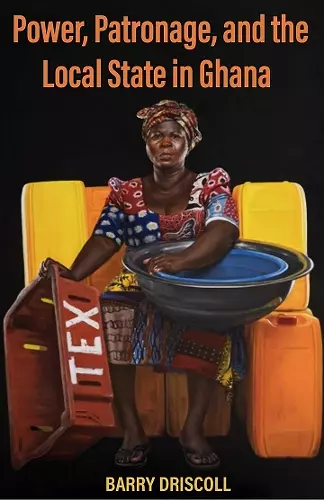Power, Patronage, and the Local State in Ghana
Format:Hardback
Publisher:Ohio University Press
Published:11th Jul '23
Currently unavailable, and unfortunately no date known when it will be back
This hardback is available in another edition too:
- Paperback£27.99(9780896803282)

This quantitative and qualitative account of Ghanaian development shows how closely fought elections drive subnational local state institutions to patronize party volunteers. Extrapolating from Ghana’s example, the author shows how locally salient varieties of patronage shape political competition in a variety of contexts.
How have the waves of democracy and decentralization that swept the developing world in recent decades affected states—among the most important drivers of poverty and prosperity—at national and local levels in Ghana and beyond?
State actors beneath the national level—what Barry Driscoll calls the local state—have considerable responsibility for carrying out state functions, but they are also forced to compete for these local state offices. How does a local state actually work in poor twentieth-century countries?
This book offers a descriptive account, as well as a causal explanation, of how political competition affects the local state in Ghana. Driscoll shows how closely fought elections drive local state institutions to provide patronage. The source of these demands for patronage comes not from rent-seeking bureaucrats or landed elites but from the government’s own party volunteers. Driscoll explains how electoral competition affects how local state actors are insulated from such patronage demands.
Moreover, these highly competitive, patronage-providing local governments actually have relatively better-qualified senior civil servants at their disposal. Driscoll makes sense of this paradox by introducing the logic of building administrative capacity in order to provide patronage. He then abstracts from the case of Ghana to generalize about how the effect of political competition is shaped by the locally salient variety of clientelism, which in turn is conditioned by the strength of the party system.
The book draws on fourteen months of fieldwork in six of Ghana’s districts, far from the nation’s capital city. Ethnographic and interview data come from time spent with market traders, tax collectors, politicians, and other figures in local state offices. Quantitative data come from a survey covering almost all local governments. The result is a detailed account of Ghana’s local state power dynamics that has relevant implications for states across the developing world.
“Consistently insightful, clear yet nuanced, thought-provoking from the first page onwards, and engagingly written for a wider audience, this is one of the best books written on political parties in Africa in the last decade.” -- Nic Cheeseman, author of Democracy in Africa: Successes, Failures, and the Struggle for Political Reform
“Barry Driscoll’s close-up, empirically meticulous study of clientelism in Ghana challenges a great deal of widely shared received wisdom on political linkages in electoral democracies. He shows that intense inter-party competition may actually magnify rather than reduce clientelistic allocation of benefits and that some variants of greater state capacity are quite compatible with extensive clientelism, if not facilitating it. The persuasiveness of Driscoll’s investigation follows from a research strategy that operates at three levels. It combines, first, thick description of local transactional practices based on personal observation in select administrative districts with, second, quantitative analysis of subnational linkage patterns across all of Ghana and, third, situating the Ghanaian experience of political linkage mechanisms in a broad regional comparative examination. Driscoll’s inquiry is thought provoking and should be required reading for any scholar venturing to contribute to the field of democratic linkage studies.” -- Herbert Kitschelt, coauthor of Patrons, Clients and Policies: Patterns of Democratic Accountability and Political Competition
The book’s six chapters make a significant scholarly contribution by unpacking how political parties navigate the relationship between local state actors and lower-level factions within a political party. * Journal of Development Studies *
Barry Driscoll’s book is an empirically grounded masterpiece. -- Adeniyi S. Basiru * African Studies Quarterly *
ISBN: 9780896803275
Dimensions: unknown
Weight: unknown
272 pages